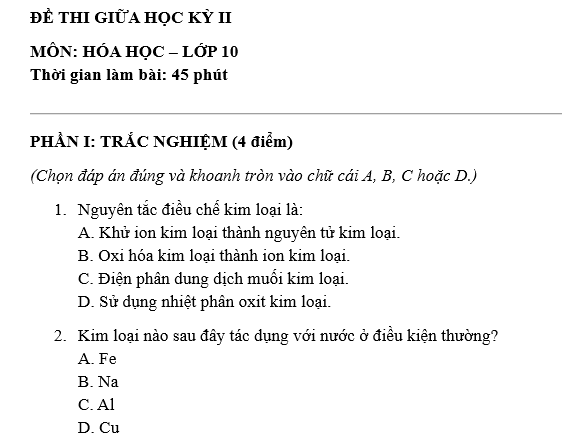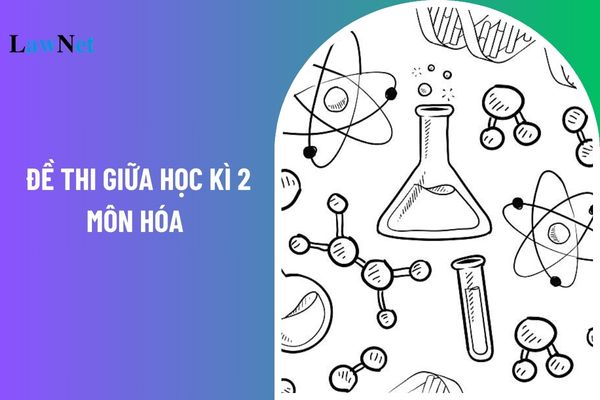What are the newest 2nd mid-semester question papers and answers for 10th-grade Chemistry in 2025? What is the required knowledge regarding atomic structure in the Chemistry curriculum for 10th-grade students in Vietnam?
What are the newest 2nd mid-semester question papers and answers for 10th-grade Chemistry in 2025?
Download 2nd mid-semester question papers for 10th-grade Chemistry
Download 2nd mid-semester question papers for 10th-grade Chemistry

Note: The information is for reference only!

What are the newest 2nd mid-semester question papers and answers for 10th-grade Chemistry in 2025? What is the required knowledge regarding atomic structure in the Chemistry curriculum for 10th-grade students in Vietnam?
What is the required knowledge regarding atomic structure in the Chemistry curriculum for 10th-grade students in Vietnam?
Under the General Education Program for Natural Sciences issued along with Circular 32/2018/TT-BGDDT, the required knowledge regarding atomic structure in the Chemistry curriculum for 10th-grade students in Vietnam is as follows:
Components of an Atom
An atom is extremely small, consisting of two main parts: the nucleus and the atomic shell.
The nucleus is made up of protons (p) with a positive charge and neutrons (n) with no charge.
The atomic shell contains electrons (e) with a negative charge.
Mass comparison: the mass of an electron is much smaller compared to protons and neutrons. The size of the nucleus is also much smaller than the entire size of the atom.
Chemical Elements
A chemical element is a set of atoms sharing the same number of protons in their nuclei.
Atomic number is the number of protons present in the nucleus of an atom of an element.
Isotopes are atoms of the same element, but with different numbers of neutrons.
Atomic mass is the relative mass of an atom compared to the atomic mass unit (amu).
Average atomic mass is calculated based on the mass and percentage of atoms of the isotopes as provided in the mass spectrum.
Atomic Electron Shell Structure
The Rutherford-Bohr atomic model describes the movement of electrons around the nucleus in defined orbits, while the modern model uses atomic orbitals (AO) to describe the space with a high probability of finding electrons.
Atomic orbitals have distinctive shapes, for example: the s orbital is spherical, the p orbital is shaped like a figure-eight.
The electron shell includes multiple sub-shells, each sub-shell having a certain number of orbitals.
The electron configuration is written by shell, sub-shell for elements with an atomic number Z from 1 to 20, or by orbital boxes.
Based on the outermost electron configuration, one can predict the basic chemical properties of the element, classifying it as metal or non-metal.
In Vietnam, what are the specific competencies required for students in the Natural Science subject?
According to the General Education Program for Natural Sciences issued by Circular 32/2018/TT-BGDDT, the specific competencies required for students in the Natural Science subject are outlined.
Natural Science subjects help students develop scientific competencies, including three main components: scientific comprehension, exploring nature, and applying learned knowledge and skills. To be specific, the manifestations of each competency component are presented as follows:
Scientific Comprehension
Students can present and explain core knowledge on structure, diversity, systematics, laws of motion, and interactions in the natural world. Specific manifestations include:
Recognizing, naming objects, phenomena, concepts, and natural laws.
Presenting characteristics and roles of objects and phenomena through spoken and written language, diagrams, charts, formulas, etc.
Classifying, comparing, and analyzing characteristics of objects and phenomena based on specific criteria.
Using keywords, scientific terms, connecting information, and outlining while reading and presenting scientific texts.
Explaining relationships between natural phenomena (cause-effect relations, structure-function, etc.).
Detecting errors and making adjustments while providing critical evaluations.
Exploring Nature
Students perform basic skills to explore and explain natural phenomena in practice and substantiate issues with scientific evidence. Specific manifestations include:
Proposing issues and raising questions: Identifying issues, raising questions, analyzing context to propose issues based on existing knowledge.
Formulating hypotheses: Analyzing issues, predicting outcomes, and stating hypotheses to be studied.
Planning implementation: Constructing exploration content logically, choosing appropriate methods (observation, experimentation, investigation, interview, etc.), planning deployment.
Implementing the plans: Collecting and processing data, evaluating results based on statistical parameters, comparing with hypotheses, and drawing conclusions.
Reporting and discussion: Expressing research results through documents, diagrams, charts, writing scientific reports, and discussing and defending viewpoints.
Making a decision and proposing solutions: Making decisions and proposing ways to address the studied issues.
Application of Acquired Knowledge and Skills
Students use scientific knowledge to explain natural phenomena, environmental issues, and sustainable development and find solutions to problems in life. Specific manifestations include:
Recognizing and explaining real-world issues based on scientific evidence.
Proposing and implementing solutions for environmental protection, adapting to climate change, and aiming for sustainable development.

